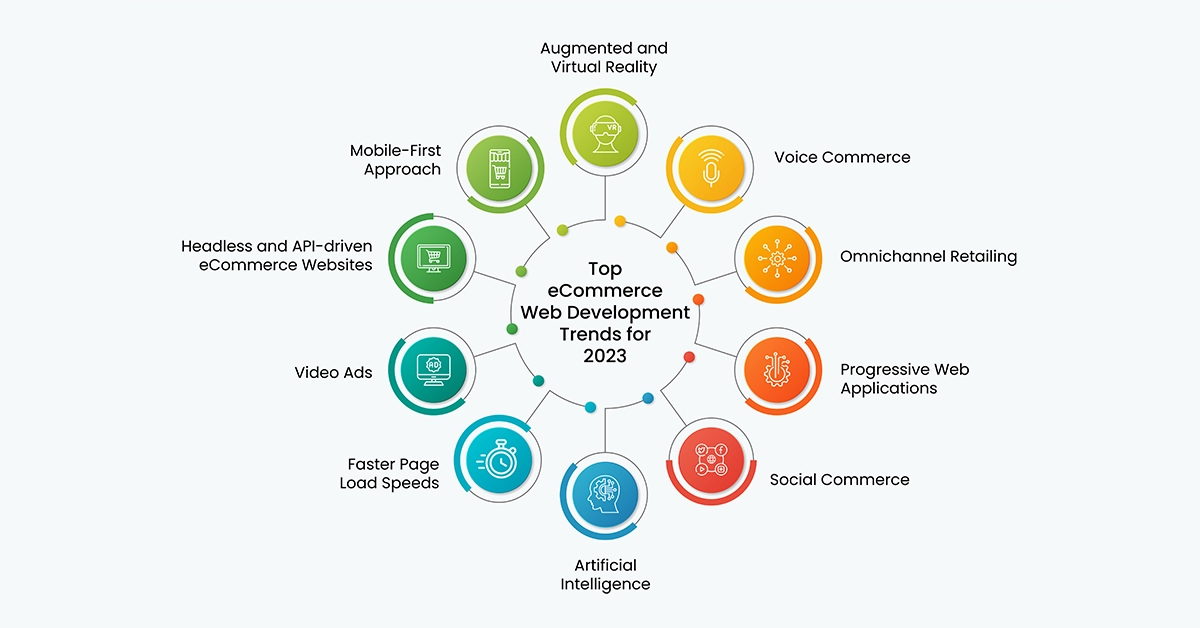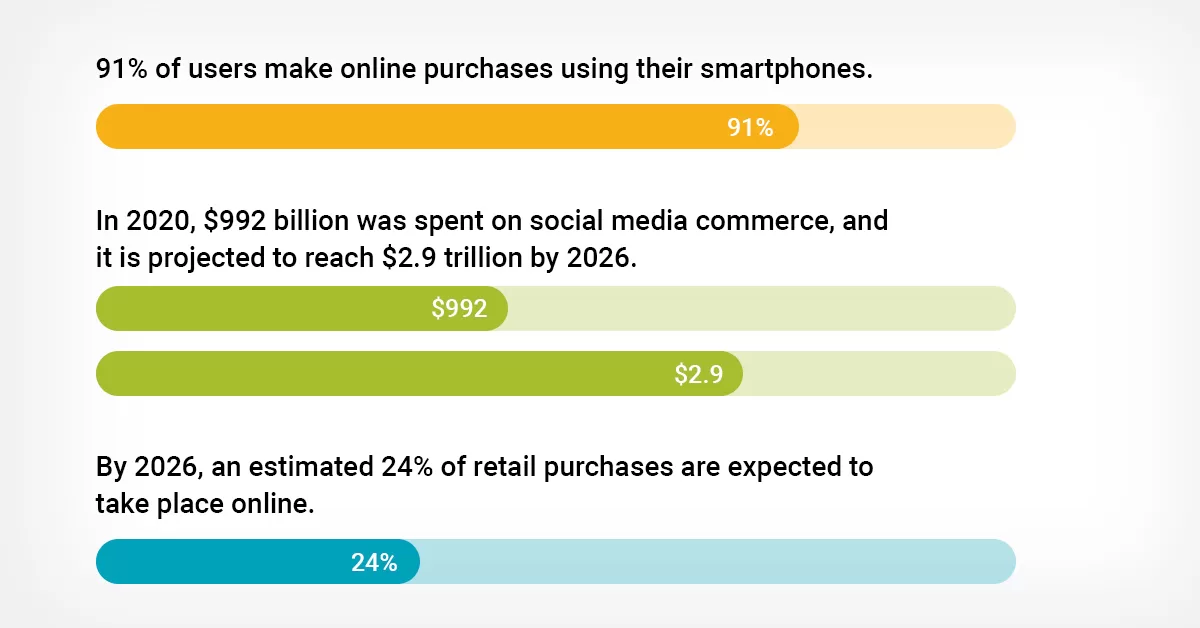Building for Tomorrow
With more than a fifth of all retail sales projected to come from eCommerce by 2024, businesses around the globe are investing in custom eCommerce website development services to garner a share of this lucrative market. However, building the right online storefront is no child’s play. It demands strategic planning and a keen eye on emerging trends in eCommerce. This blog will explore the top eCommerce web development trends expected to shape the industry in 2023.

Voice Commerce: The Rise of Conversational Shopping
The convenience of voice search is gradually replacing the typing era in search queries. The increasing usage of smart speakers and voice assistants like Google Assistant, Alexa, and Siri has revolutionized how we interact with digital devices. The convenience of speaking over typing has propelled voice search into the mainstream, making it a top trend in custom eCommerce website development.
Omnichannel Retailing
Omnichannel retailing — selling across multiple channels — is no longer a nice-to-have but a must-have for online businesses. By offering a seamless shopping experience across all touchpoints, businesses can target a broader customer base, regardless of where they begin their buying journey. Key strategies for delivering an omnichannel experience include investing in PWAs, optimizing for mobile devices, and utilizing tools to enhance the omnichannel journey.
Progressive Web Applications (PWAs): Blending Performance and Accessibility
Slow site speed and poor user experience have long been the bane of eCommerce websites. To counter these issues, businesses are turning to Progressive Web Apps (PWAs). These offer an app-like experience on the web, delivering a seamless user experience across desktop and mobile devices.
PWAs come with several benefits, including easy installation on desktop/mobile devices, discoverability on the web, support for functionalities typical of native apps, and easy sharing via links. As such, they are quickly becoming a significant trend in custom eCommerce website development.

According to Forbes, here are some significant e-commerce statistics for 2023:
Social Commerce
Social media platforms have become more than just a space for connecting and interacting with people. They are now a powerful tool for online shopping. Social commerce is fast becoming a key trend in eCommerce, with platforms displaying ads for products that users can buy directly. Businesses are leveraging the vast user base of social media platforms to increase sales and reach more customers.
Artificial Intelligence
Among the transformative technologies reshaping the eCommerce landscape is Artificial Intelligence (AI). AI offers a range of benefits for online businesses, from product recommendations to predictive analysis. Applications of AI in eCommerce include learning about customer preferences, delivering personalized user experiences, enhancing the shopping experience with real-time insights, and optimizing pricing and discounting policies.
By resolving customer queries and issues in real-time, AI-powered chatbots improve customer satisfaction and free up human resources to work on more complex tasks. Businesses can leverage custom eCommerce website development services to integrate AI into their online stores.
Faster Page Load Speeds
Page load speed has long been a critical factor for website rankings and conversions. With Google’s Core Web Vitals update, it’s more important than ever for businesses to ensure their websites load quickly. By building lightweight and fast-loading websites, developers can help eCommerce businesses rank higher in search results, attract more traffic, and increase conversions.
Video Ads
Captivating and Interactive Marketing Shoppable video ads present a compelling way for customers to shop directly within the video content, eliminating the need to navigate away from the site. Businesses can create interactive experiences that engage customers and drive conversions by incorporating product details, pricing, and stock information.
Headless and API-driven eCommerce Websites
While customers interact directly with the front-end of an eCommerce website, the back-end tech infrastructure plays a crucial role in shaping the overall user experience. Headless eCommerce is a new trend where the eCommerce platform is decoupled from the front-end presentation layer.
This approach allows businesses to use Digital Experience Platforms (DXPs), Content Management Systems (CMSs), PWAs, or other custom front-ends in their tech stack. The adoption of headless eCommerce websites is expected to increase in 2023, with PWAs being a popular choice for the front-end solution.
Mobile-First Approach: Seamlessly Adapting to the Mobile Shopper
In 2023, custom eCommerce website development services will focus more on creating mobile-friendly websites with app-like functionality. This strategy caters to the habits of smartphone users, who spend most of their online time on mobile apps. Responsive design ensures a consistent user experience across devices and screen sizes. By embracing mobile commerce, businesses can tap into a vast customer base and maximize conversion rates.
Augmented and Virtual Reality
AR and VR technologies have overcome many limitations of online shopping by allowing customers to preview products and experience services before buying. Imagine being able to browse products, ask questions, and make purchases in real time while enjoying a live shopping experience. Live shopping is gaining momentum as a trend that fosters deeper customer engagement and enhances personalization. Businesses can boost sales and cultivate customer loyalty by integrating interactive elements and encouraging customer participation.
Airbnb and IKEA, among other companies, are already using these technologies to offer immersive shopping experiences.
Some more e-commerce web development trends are Mobile Wallets and Contactless Payments, Single-Page Applications (SPAs), Micro-interactions and Micro-animations, and Gamification.
In summary
Online shopping has grown exponentially, making it easier and more convenient for customers to buy what they need. From voice search and omnichannel retailing to AI, chatbots, and AR/VR technologies, these trends are reshaping the eCommerce industry. Businesses must keep abreast of the latest trends and utilize custom eCommerce website development services to create modern, feature-rich eCommerce websites that deliver superior shopping experience and drive business growth.
Add new comment